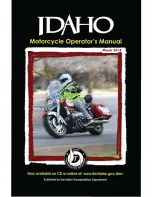
166
Technical Information
Oxygenated Fuels
Some conventional gasolines are being
blended with alcohol or an ether compound.
These gasolines are collectively referred to as
oxygenated fuels. To meet clean air standards,
some areas of the United States and Canada use
oxygenated fuels to help reduce emissions.
If you use an oxygenated fuel, be sure it is
unleaded and meets the minimum octane rating
requirement.
Before using an oxygenated fuel, try to confirm
the fuel’s contents. Some states/provinces require
this information to be posted on the pump.
The following are the EPA-approved percentages
of oxygenates:
ETHANOL (ethyl or grain alcohol) up to 10% by
Volume
You may use gasoline containing up to 10%
ethanol by volume. Gasoline containing ethanol
may be marketed under the name “Gasohol.”
METHANOL (methyl or wood alcohol) up to 5%
by Volume
You may use gasoline containing methanol
containing up to 15% methanol by volume as
long as it contains cosolvents and corrosion
inhibitors to protect the fuel system. Gasoline
containing more than 5% methanol by volume
may cause starting and/or performance problems.
It may also damage metal, rubber, and plastic
parts of your fuel system.
If you notice any undesirable operating
symptoms, try another service station or switch
to another brand of gasoline.
Fuel system damage or performance problems
resulting from the use of an oxygenated fuel
containing more than the percentages of
oxygenates mentioned above are not covered
under warranty.
Oxygenated fuels can damage paint and plastic.
Be careful not to spill fuel when filling the fuel
tank. Wipe up any spills immediately.
NOTICE
Oxygenated fuels can damage paint and plastic.
17 CRF450X̲31MEY710.indb 166
17 CRF450X̲31MEY710.indb 166
2016/06/08 11:46:29
2016/06/08 11:46:29
















































